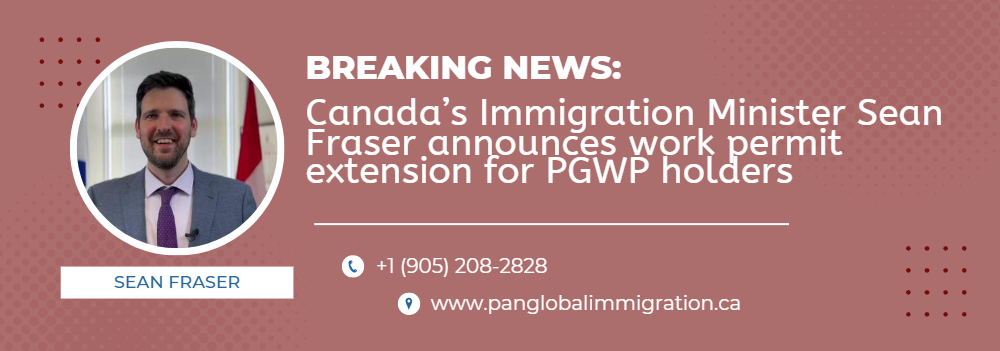Sean Fraser, Canada’s Minister of Immigration, has announced an extension of the work permit for PGWP holders.
With the help of the Post-Graduation Work Permit (PGWP), international students can work in Canada while pursuing their dream of becoming permanent residents.
Sean Fraser, Canada’s Minister of Immigration, recently announced that as of April 6, 2023, individuals with an expiring Post-Graduation Work Permit (PGWP) will be able to apply for an Open Work Permit extension.
Anyone whose PGWP expires in 2023 may apply for an Open Work Permit extension. Additionally, it will be accessible to those whose PGWP expired in 2022 and who applied for an Open Work Permit extension with the IRCC last year.
Candidates can submit an application for the extension on the IRCC website starting on April 6. Those who submit an application will receive an email with a temporary work authorization that they can present to their employers in order to continue working legally in Canada.
Even if their status expired outside of the 90-day grace period offered by Immigration, Refugees and Citizenship Canada (IRCC), individuals whose legal status in Canada has expired will be able to apply concurrently to restore their status. As of April 6, these people will be able to reinstate their status and obtain a temporary Open Work Permit at the same time.
Starting on April 6, the IRCC says it will send notifications to those who qualify for the extension inviting them to access their online IRCC Secure Account.
International students who complete an eligible educational programme at a Canadian-designated educational institution are eligible for Post-Graduation Work Permits (PGWPs) (DLI).
DLIs are schools like colleges and universities that have received government approval to accept foreign students.
PGWPs allow foreign graduates to work in Canada for any employer of their choice for a maximum of three years (the length of a PGWP is determined by the length of the educational programme completed by the international graduate).
International students highly prize PGWPs because of the structure of Canada’s economic class immigration programmes.
Candidates who have studied and worked in Canada are frequently rewarded by these programmes.
This is justified by research from Statistics Canada that demonstrates how such study and employment experiences can support the integration of international students who later become citizens of Canada.
It is believed that obtaining a Canadian education, working in Canada, honing one’s English or French, and establishing social networks there will all help these immigration candidates integrate economically.
As a result, some routes, like the federal Express Entry system, give more points to applicants who have studied and worked in Canada.
Additionally, there are provincial routes that are available only to graduates from abroad, like the Provincial Nominee Program (PNP).
The majority of foreign students studying in Canada express interest in applying for permanent residence.
Higher international student levels are a result of Canada’s openness to foreign talent and rising immigration rates.
At the end of 2022, Canada was home to over 800,000 foreign students, setting a record.
The vast majority of temporary residents (TRs) who move to permanent residence are PGWP holders (PR).
Nearly 98,000 PGWP holders, or about 82% of all TRs who became PRs in 2022, became permanent residents.
In 2023, Canada hopes to accept a record 465,000 new permanent residents; by 2025, the goal will be 500,000.
Although Minister Fraser has repeatedly expressed his desire to assist with such transitions, Canada does not have a specific target of TRs it seeks to convert to PR.
Increased TR to PR transitions via Express Entry is one of Minister Fraser’s priorities, according to the mandate letter that the Prime Minister Justin Trudeau gave him.
PGWP holders can now apply for Open Work Permit extensions because IRCC has made two exceptions in recent years due to the high demand for PGWP holders to become permanent residents.
These exceptions were made in order to give these people more time to possibly apply for permanent residence.
Those whose PGWP expired between September 2021 and the end of December 2022 qualified for the final exception.
At the end of 2022, according to IRCC, there were more than 286,000 PGWP holders in Canada. About 67,000 PGWP holders have already applied for permanent residency, so they won’t need to renew their work permits under this initiative when their 127,000 PGWPs expire in 2023.

